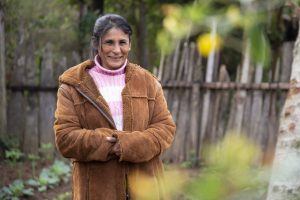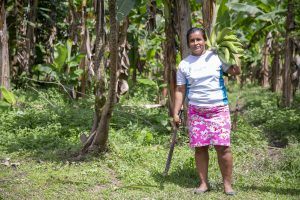OGP as a Key Partner to Implement the Escazu Agreement
OGP como socio clave en la implementación del Acuerdo de Escazú
The transparencyAccording to OGP’s Articles of Governance, transparency occurs when “government-held information (including on activities and decisions) is open, comprehensive, timely, freely available to the pub... More, participation, and collaboration tools, mechanisms, instruments, and platforms related to the open government action planAction plans are at the core of a government’s participation in OGP. They are the product of a co-creation process in which government and civil society jointly develop commitments to open governmen... co-creation processCollaboration between government, civil society and other stakeholders (e.g., citizens, academics, private sector) is at the heart of the OGP process. Participating governments must ensure that a dive... contribute to the implementation of the Escazú Agreement. In turn, the Escazú agreement provides regional standards on information, participation and justiceTo address barriers that prevent citizens from having their justice needs met, OGP participating governments are working to expand transparency, accountability, and inclusion into all systems of justi... in environmental matters that can greatly benefit OGP.”
The Escazu Agreement entered into force on April 22 after 12 Latin American countries ratified it. On a global scale, this treaty is especially innovative because it guarantees the right of access to environmental information, public participationGiving citizens opportunities to provide input into government decision-making leads to more effective governance, improved public service delivery, and more equitable outcomes. Technical specificatio... in environmental decision-making processes, and access to justiceAccessible justice systems – both formal and informal – ensure that individuals and communities with legal needs know where to go for help, obtain the help they need, and move through a system tha... More in environmental matters. More importantly, it provides measures and mechanisms to exercise and enforce these rights. It is the only binding agreement emanating from the United Nations Sustainable Development Conference (Rio + 20), the first regional environmental agreement in Latin America and the Caribbean, and the first in the world to contain specific provisions to protect human rightsAn essential part of open government includes protecting the sacred freedoms and rights of all citizens, including the most vulnerable groups, and holding those who violate human rights accountable. T... activists.
According to the Agreement, environmental democracy is based on transparency, participation and inclusionOGP participating governments are working to create governments that truly serve all people. Commitments in this area may address persons with disabilities, women and girls, lesbian, gay, bisexual, tr... More as a basis for generating social and ecological reforms in the region. In this context, the Open Government PartnershipThe Open Government Partnership (OGP) is a multi-stakeholder initiative focused on improving government transparency, ensuring opportunities for citizen participation in public matters, and strengthen... More (OGP) has sought to advance these principles around the world for the last 10 years. OGP offers a platform that allows the implementation of standards such as EITI, Open DataBy opening up data and making it sharable and reusable, governments can enable informed debate, better decision making, and the development of innovative new services. Technical specifications: Polici... Charter, Open ContractingA transparent procurement process, known as open contracting, increases competition, improves public service delivery, and ensures governments better value for their money. Technical specifications: C... More and others. OGP can be a strategic tool in the design of implementation routes for the Agreement and can expand its scope, based on a transparent and inclusive public management model.
We have a unique opportunity. OGP is an excellent, established platform that can be used to implement the principles and obligations in the Escazú Agreement, especially in the five OGP member countries that have ratified it: Argentina, Ecuador, Mexico, Panama, and Uruguay. Even the highest leadership of ECLAC, the Agreement’s Technical Secretariat, has highlighted this on several occasions.
In fact, OGP members in the region are already using the OGP platform to co-create and implement commitments for transparent environmental information and increase citizen participationAccording to OGP’s Articles of Governance, citizen participation occurs when “governments seek to mobilize citizens to engage in public debate, provide input, and make contributions that lead to m... More. These are some examples that have shown interesting results:
Ecuador was a pioneer in committing to implement the Escazú Agreement. To achieve this, they proposed to carry out a diagnosis of congruence of the Agreement with the current political, normative and institutional framework; promote articulation with civil society organizations, academia and local movements; create a governance mechanism and co-build proposals and a roadmap to internalize the provisions of the Agreement. The commitmentOGP commitments are promises for reform co-created by governments and civil society and submitted as part of an action plan. Commitments typically include a description of the problem, concrete action..., promoted by the Ministry of the Environment, Water and Ecological Transition and the Hemisferios University, has managed to sustain the collaborative work between the government and civil society.
Mexico combined the values of open government and the Escazú Agreement to define and implement a commitment that aims to strengthen transparency on forest, water and fisheries management through monitoring groups.
In Panama, the Ministry of the Environment, civil society and academia work collaboratively to co-create a commitment on the Escazú Agreement in their action plan, which aims to improve the national environmental information systems.
Argentina committed to publishing open and interactive information on a centralized portal on climate change, greenhouse gas emissions, focusing on the publication of open environmental data and accountability to citizens.
In the last two cycles of action plans from the Americas, more than 20 commitments focus on the environment, which shows a growing interest in promoting the sustainable development and environmental protection agenda. There is an opportunity to further increase this trend in the coming years now that the Agreement has entered into force and there is a legal obligation to implement it. Two months ago, during Open Gov Week, more than 400 people joined OGP, ECLAC, and Universidad Hemisferios to learn more about the opportunities between the Escazú Agreement and OGP and how we can work with governments, civil society organizations, academia and others to create more environmentally just and transparent societies.
This historic opportunity for the OGP community to face the challenges related to access rights, civic participation and environmental justice in Latin America and the Caribbean is palpable, even with the number of challenges that many reformers face. That is why OGP will promote spaces for dialogue and peer exchange to expand knowledge and resources for implementers in the design of their roadmaps. With that in mind, we have assembled a group of experts in open government and the environment who can support and accompany those actors who are implementing commitments on the environment. As other countries begin to develop more commitments that meet the Agreement, we will develop even more tools and materials.
Las herramientas, mecanismos, instrumentos y plataformas de transparencia, participación y colaboración que constituyen el proceso de co-creación de planes de acción de gobierno abierto contribuyen a la implementación del Acuerdo de Escazú. Del mismo modo, el Acuerdo de Escazú ofrece estándares regionales en materia de información, participación y justicia en asuntos ambientales de gran utilidad para la Alianza para el Gobierno Abierto.”
El 22 de abril, con la ratificación de 12 países de América Latina, se celebró la entrada en vigor del Acuerdo de Escazú. Este tratado es innovador a nivel global porque garantiza el derecho de acceso a la información ambiental, la participación pública en procesos de toma de decisiones ambientales y el acceso a la justicia en asuntos ambientales. Más importante aún es que proporciona medidas y mecanismos para facilitar el ejercicio y ejecución de estos derechos. Es el único acuerdo vinculante emanado de la Conferencia de Desarrollo Sostenible de las Naciones Unidas (Río + 20), el primer acuerdo regional ambiental en América Latina y el Caribe y el primero en el mundo en contener previsiones específicas en relación a los activistas de derechos humanos.
Desde la perspectiva del Acuerdo, la democracia ambiental se sostiene en la transparencia, la participación y la inclusión como base para la generación de reformas sociales y ecológicas en la región. En este contexto, la Alianza para el Gobierno Abierto, (OGP por sus siglas en inglés) ha buscado impulsar estos principios alrededor del mundo durante los últimos 10 años. OGP ofrece una plataforma que permite coordinar e impulsar estándares como EITI, Open Data Charter, Open Contracting y otros. OGP puede ser una herramienta estratégica en el diseño de rutas de implementación del Acuerdo y puede ampliar su alcance, sobre la base de un modelo de gestión pública transparente e inclusivo.
La oportunidad es única, OGP es una excelente plataforma ya establecida que puede ser usada para la implementación de los principios y obligaciones incluidos en el Acuerdo de Escazú, especialmente en los cinco países miembros de la alianza que lo han ratificado: Argentina, Ecuador, México, Panamá y Uruguay. Incluso el más alto liderazgo de CEPAL, Secretaría Técnica del acuerdo, lo ha resaltado en varias ocasiones.
De hecho, miembros de OGP en la región ya están utilizando la plataforma de OGP para co-crear e implementar compromisos para transparentar información ambiental e incrementar la participación ciudadana. Estos son algunos ejemplos que han mostrado resultados interesantes:
Ecuador fue pionero en comprometerse a implementar el Acuerdo de Escazú. Para lograrlo, se propusieron realizar un diagnóstico de congruencia del Acuerdo con el marco político, normativo e institucional vigente, promover la articulación con organizaciones de la sociedad civil, academia y movimientos locales, generar un mecanismo de gobernanza y co-construir propuestas y hoja de ruta para avanzar en el proceso de internalización de las disposiciones del Acuerdo. El compromiso, impulsado por el Ministerio del Ambiente, Agua y Transición Ecológica y la Universidad Hemisferios, ha logrado sostener el trabajo colaborativo entre gobierno y sociedad civil.
México conjugó los valores del gobierno abierto y del Acuerdo de Escazú en la definición e implementación de un compromiso que apunta a fortalecer la transparencia sobre la gestión de bosques, agua y pesca a través de grupos de monitoreo
En Panamá, el Ministerio de Ambiente, sociedad civil y academia trabajan colaborativamente en la co-creación de un compromiso sobre el Acuerdo de Escazú en su próximo plan, que apunta a mejorar los sistemas de información ambiental nacionales.
Argentina se comprometió a publicar información abierta e interactiva en un portal centralizado sobre el cambio climático, emisiones de gases de efecto invernadero enfocándose en la publicación de datos abiertos ambientales y la rendición de cuentas a la ciudadanía.
En las Américas, fueron co-creados más de 20 compromisos sobre ambiente en los dos últimos ciclos de planes de acción, lo que demuestra un creciente interés en el impulso de la agenda de desarrollo sostenible y protección ambiental. Existe una oportunidad que aumente aún más esta tendencia en los siguientes años ahora que el Acuerdo ha entrado en vigor y existe la obligación legal de su implementación. Hace dos meses, durante la Semana de Gobierno Abierto (OpenGovWeek), más de 400 personas acompañaron a OGP, CEPAL y Universidad Hemisferios para aprender más sobre las oportunidades entre el Acuerdo de Escazú y OGP y cómo podemos trabajar con gobiernos, organizaciones de sociedad civil, academia y demás para crear sociedades ambientalmente más justas y transparentes.
Esta oportunidad histórica para la comunidad de la OGP de enfrentar los desafíos vinculados a los derechos de acceso, la participación cívica y la justicia ambiental en América Latina y el Caribe es palpable, aun con la cantidad de desafíos que muchos y muchas reformadores enfrentan. Es por ello que OGP impulsará el diálogo e intercambio de experiencias para ampliar los conocimientos y recursos para los implementadores en el diseño de sus rutas de trabajo. Con este objetivo en mente hemos reunido un grupo de expertos en gobierno abierto y ambiente, que puedan brindarle apoyo y acompañamiento a aquellos actores que están implementando compromisos ambientales. A medida que otros países empiecen a desarrollar más compromisos que atiendan el Acuerdo, desarrollaremos más materiales y herramientas.
No comments yet
Related Content
 Challenges and Solutions
Challenges and Solutions Environmental Democracy: Where Open Government and the Escazu Agreement Meet
In 2018, 22 countries from Latin America and the Caribbean reached a historical milestone in environmental democracy by signing the Escazu Agreement. In 2020, 20 countries have ratified the treaty…
 Challenges and Solutions
Challenges and Solutions Bridging the Gap to Protect Environmental Rights
OGP can serve as a space to ensure that efforts to enhance information, participation, and accountability translate into concrete outcomes to address the issues that environmental defenders are facing.



Leave a Reply